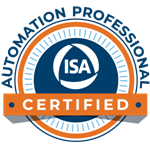In this blog series, ISA Interchange interviews automation leaders about their experience with the International Society of Automation (ISA) Certified Automation Professional ® (CAP ®) certification.
 This first post in the series features Scott Sommer, a licensed professional engineer with 40+ years of experience in automation, instrumentation, and process control design and applications, for engineering and design firms, manufacturers, and service providers.
This first post in the series features Scott Sommer, a licensed professional engineer with 40+ years of experience in automation, instrumentation, and process control design and applications, for engineering and design firms, manufacturers, and service providers.
ISA Interchange: Can you tell us more about you and your professional experience/educational background?
Sommer: I earned a BS and an MS in Chemical Engineering and began my career in 1981 as a process engineer in a chemical plant in Southwest Louisiana. About six months into my career, I was assigned to a plant modernization project where I was responsible for the configuration and installation of one of the first Provox control systems and Modicon 384 PLC. Over the next 10 years, I worked at several different manufacturers as an automation engineer, and in 1991, I became majority owner of a successful small systems integration firm in Cincinnati, Ohio. I sold my interest in 2000 and began the next phase of my career in the pharmaceutical industry, where I remain to this day. Currently, I am Department Manager, I&C/Automation for DPS Group Global in Conshohocken, PA, a suburb of Philadelphia.
ISA Interchange: How did you become familiar with ISA? What led you to consider earning a Certified Automation Professional (CAP) certification?
Sommer: In 1985, I became a licensed Professional Engineer (PE), and found that credential has served me well over the years. However, my PE was based in my chemical engineering background, and there was nothing available for me to demonstrate proficiency and experience in process automation. (This was many years prior to the availability of the CSE PE exam option).
I first become familiar with ISA through my first few employers, all chemical companies, who arranged for the engineers to attend the ISA Expo in Houston each year. I became an ISA member a few years later and am currently a senior member, close to achieving life member status.
In 2005, I was reading the latest copy of InTech at my desk, and I saw the ad for the CAP credential. I was intrigued that a certification dedicated to automation professionals was then available, so I applied for the exam right away and passed the test later that spring.
ISA Interchange: What value or benefits does a CAP certification provide, and how does it differ from other certifications in the industry?
Sommer: The benefits of CAP certification for the individual and the employer are just as true today as they were then. As with my PE license, earning my CAP certification did not directly give me a bump in pay, but I am convinced that my PE and CAP together have kept me competitive over my 42-year career. CAP has opened several doors in my career, including supervisory positions, technical lead positions, and teaching positions.
Having worked in engineering and design for the past 23 years, I know my CAP certification has given me, and my employers, a competitive advantage when bidding on work and dealing with clients. CAP shows that the holder has a requisite level of experience, knowledge, and competency over the breadth of automation engineering.
CAP has also opened up leadership opportunities for me at ISA, including being a member, and eventually, Chair of the CAP Steering Committee, during the years it was operational.
CAP is the only certification available that specifically assesses competence in the technical, project, and managerial aspects of automation engineering. ISA has certifications that are specific to a single topic within automation, such as cybersecurity. However, CAP covers all aspects of automation engineering and gives those who achieve this certification a breadth of experience, a proven ability to grasp the big picture, and an understanding of how the task at hand fits into and affects the process, and the project as a whole.
ISA Interchange: What additional advice do you have for new professionals entering the field?
Sommer: My academic advisor while I was getting my BS degree told me I should start in an operating manufacturing plant. That is where I would learn how pumps, instruments, valves, and other equipment really worked. Great advice! I learned more in my first six months on the job than in four years of college.
I would also advise young engineers to not be afraid of seeking out new experiences, even if they don’t seem glamorous. I learned more about dealing with technicians, pipe fitters, millwrights, and others during a three-week stint on third shift repacking reactor catalyst while in “moon suits” in hot, humid southwestern Louisiana in July. This and other similar experiences gave me confidence, insight, and patience that have served my career well.
The final universal piece of advice is that you can never stop learning. Never. One of the things that CAP requires for renewal is continuing professional development. This is essential to keep on top of the field, to broaden knowledge, and kindle an inquisitive spirit in all an automation engineer does. I have found that having pursued various professional development activities over the years has given me a passion for mentoring and teaching the next generation of automation engineers.
About CAP Certification
The ISA Certified Automation Professional® (CAP®) certification demonstrates your commitment to excellence, as well as your expertise and knowledge of automation and controls. When you earn ISA CAP certification, you receive a non-biased and objective confirmation of your skills and expertise as an automation professional. The CAP Body of Knowledge is extensive and is derived from the actual practice of automation professionals in the field.
Who Are CAPs?
 CAPs are individuals who have demonstrated their extensive knowledge of automation and controls and that they have the expertise and qualifications to excel in their fields. More than 600 automation professionals around the world have achieved this distinction, and are responsible for a wide variety of activities in the manufacturing and automation industries, including direction, definition, design, development/application, deployment, documentation and support of software and equipment systems used in control systems, manufacturing information systems, systems integration, and operational consulting.
CAPs are individuals who have demonstrated their extensive knowledge of automation and controls and that they have the expertise and qualifications to excel in their fields. More than 600 automation professionals around the world have achieved this distinction, and are responsible for a wide variety of activities in the manufacturing and automation industries, including direction, definition, design, development/application, deployment, documentation and support of software and equipment systems used in control systems, manufacturing information systems, systems integration, and operational consulting.
To learn more about CAP and apply for certification, visit https://www.isa.org/certification/cap.




